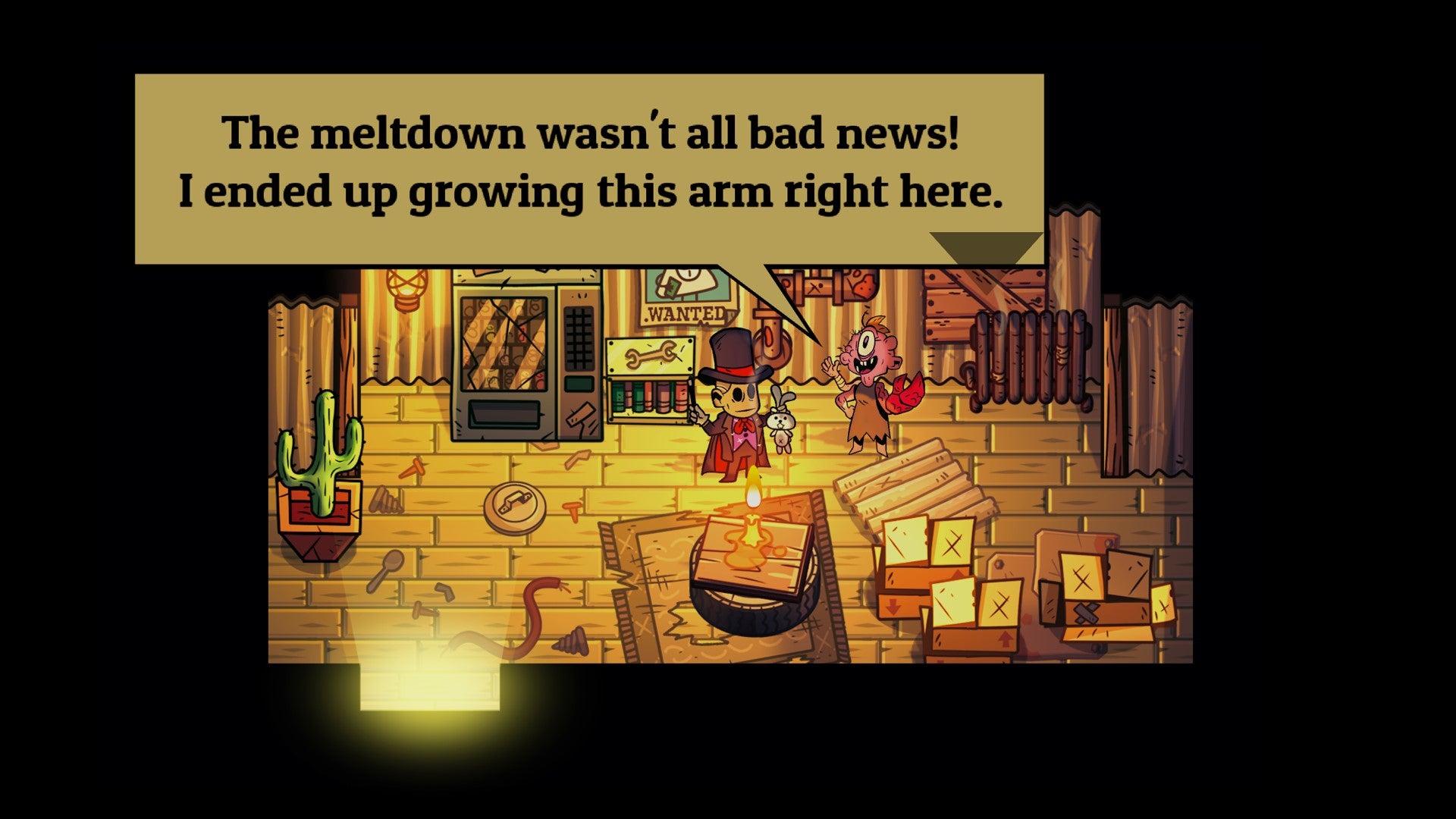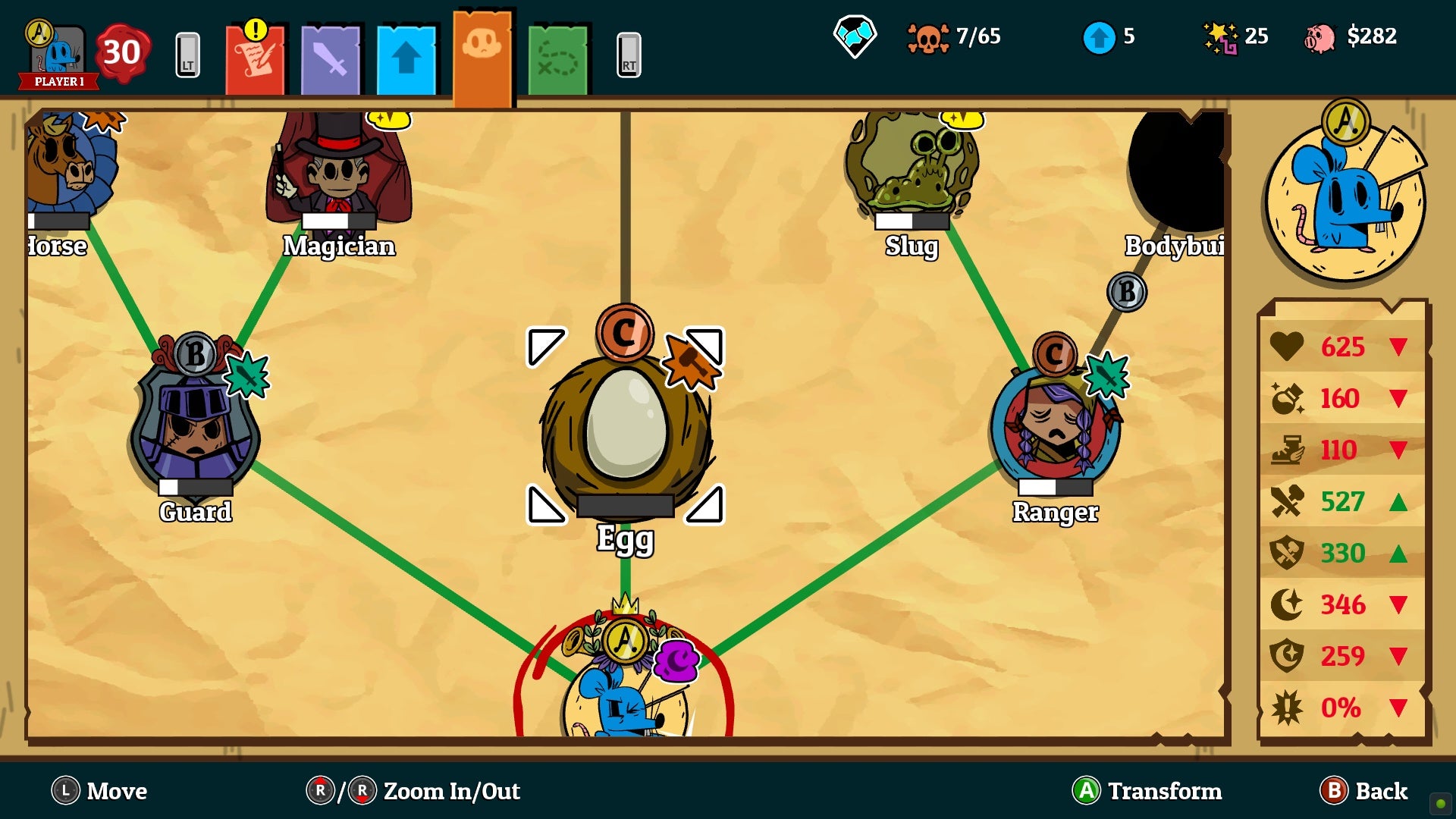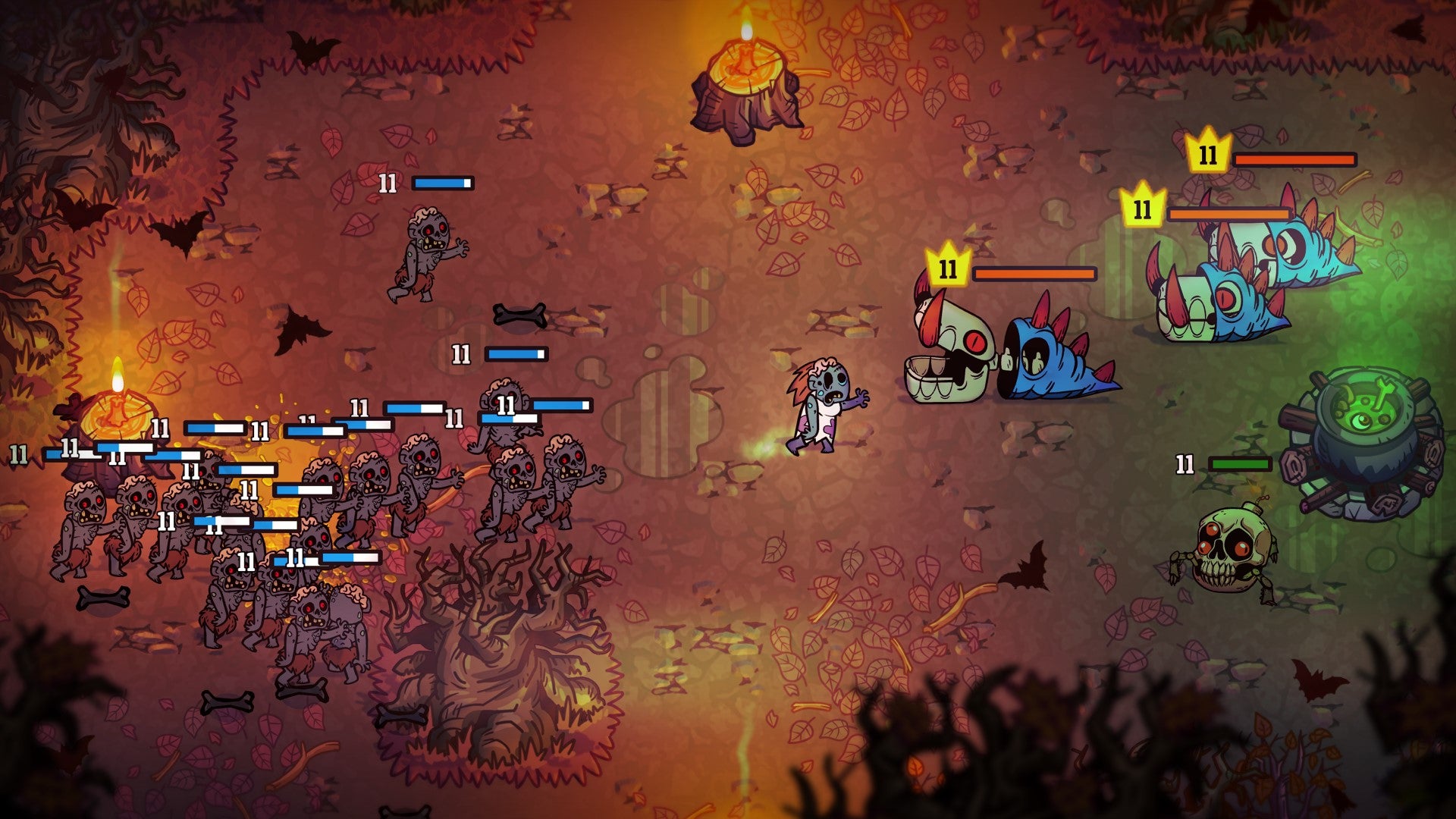In Nobody Saves The World, said world has succumbed to The Calamity, a dark force that’s mutated its residents into blubbery eyes that spit spikes and sentient puddles of acid. A great mage called Nostramagus usually keeps these at bay but, in classic fashion, he’s gone missing. In you step as Nobody, a deflated Michelin Man who inherits Nostramagus’ powers and can shapeshift into various forms as a result. With this great power, you must dungeon-crawl in a bid to gather the scattered pieces of a magical gemstone capable of burning away the blight, and most importantly, saving the world. And what a lovely world it is, despite the rampaging mutant issue. You’ve got little towns and thick jungles and arid deserts all rendered in this gorgeous, cartoony aesthetic. The game has a playful charm about it, with bizarre characters that spit funny quips. One of my favourites is Randy the Red, a spiteful wizard who believes he’s Nostramagus’ true heir, not some little nobody like you. Colourful portraits bring his character to life: jealousy is bulging eyes, a gaping jaw, and text that rattles. The way he switches between frantic to conniving is magnificent. It’s a shame, then, that these interactions are few and that many of the game’s characters rarely have much of value to say. Nobody Saves The World knows it’s riffing off classics like The Legend Of Zelda, and while this self-awareness leads to some fun references, the game traps itself in a sort of nonchalance. The world may be beautiful, but it is simply “The World”, a generic fantasy realm with little history. NPCs you encounter may be quirky, but conversations are brief; meta lines to make you chuckle or basic fetch quests. “You look strong, can you help me defeat some monsters?”. Aid almost any NPC and they’ll hit you with a snappy thanks… and that’s your lot. Sure, you earn some EXP, but this recompense feels hollow without meaningful stories. The game commits so hard to its referential humour that it’s often overly dismissive. The joke is that you’re playing an RPG, but the punchline grows weaker as you progress. Is this a world you want to save? Well, I guess so. One thing the game gets – mostly – right is its transformations. These can take many forms: a bodybuilder that bench presses enemies, a horse that trots fast, a slug that leaves sticky gloop in its wake. At first, you’re only able to transform into a rat, letting you sneak into small passageways and poison enemies with vicious bites. To unlock more, you’ll need to complete quests specific to certain forms. Let me explain. As a rat, you may have a quest that’s like, “Poison 20 enemies”. Do so, and you’ll earn both EXP and FP. EXP ups your overall level, increasing your base stats incrementally and providing no more excitement than a rainy afternoon watching Tipping Point. FP, or “Form Points”, will up your rat’s grade. So, you may go from a “D” to a “C”, not only unlocking more quests, but new abilities too; a good level of excitement, like someone from The Chase getting back to the bench with a top offer. That’s not all! Your forms belong to an interconnected web of other forms, some of which are locked behind grade requirements. The powerful monk, for example, requires you hit grade A with both the Horse and the Magician. It’s a smart system that encourages experimentation, especially when it comes to mixing and matching abilities from different forms. My favourite build is a mix-up between Magician and Zombie. I’m able to pull rabbit and tigers out of a hat to fight by my side, as well as infect enemies who’ll turn into zombies after a quick mauling. My army of the living creates an army of the dead – which rules. Although, I would say mixing abilities is more of a priority than switching forms, and that’s down to how combat works. As dungeons get harder, enemies are protected by “Wards”, a.k.a. barriers you need to shatter by matching their damage type. Different forms specialise in different damage types, so in theory, you’d think switching between them on the fly would be key to victory. This might be the case early on when you lack the credentials, but as your pool of abilities grows, the more obsolete switching becomes. Most dungeons feature one or two wards, so I can tailor my Magician with all the damage types needed to break them. It seems an odd design decision. Some forms are left untouched, while others exist simply to fulfil a very specific role, like those token Pokémon you’d give Rock Smash to. Perhaps it comes down to the dungeons and the combat, which just aren’t particularly exciting. The joy of combat in Nobody Saves The World stems from impact. The rat nibbles enemies. The Zombie mauls and infects. The Ranger slings arrows. There’s a deep pleasure in hitting mutants in different, satisfying ways. But because dungeons rarely demand more than one form, repetition sets in. And no matter where you may be, from the innards of a fallen dragon to a nuclear facility, dungeons all follow a set structure: corridors and stairs and corridors… and stairs. No puzzles. Only kill requirements or keys to find. The repetition sets in even further. Combat eventually suffers the same fate. Even if enemies chase and spew bile and chomp and buff their allies, almost every encounter can be solved by bunching these baddies together and cleaving them down as a clump. No matter what form you choose – horse, turtle, whatever - your technique becomes that of the Pied Piper, just sporting a different flute. Granted, some dungeons have special challenges. Wards refresh, or enemies deal x9999 damage. Occasionally, some have traps! I wasn’t able to give co-op a whirl, but it’s possible to play online with a single buddy, and I’d imagine this elevates the experience somewhat. Everything is better with friends, after all, and some laughter and chatter would complement the dungeon-crawling nicely. Thing is, dungeons only exist to further EXP and FP. Aside from numbers and forms, there isn’t anything else to chase. You clear dungeons to watch grades and bars rise. Crack open chests at the end of a dungeon and you’ll get some tokens. What do they do? Up some numbers. I suppose this gives the game a clear focus, but it’s one that gradually wears you down. This a game built for churning through, and that’s the problem. Nobody isn’t so much as saving the world, but clearing it, instead.


